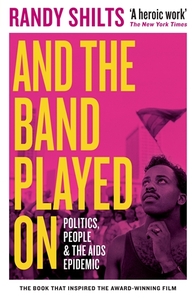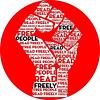You need to sign in or sign up before continuing.
Take a photo of a barcode or cover
The scientific behind-the-scenes was fascinating and depressing, the government indifference infuriating, and the slow growing of cultural awareness heartbreaking. Such an important narrative, and so well-written - hard to put down!
If I could give this amazing book 6 stars I would. I going to recommend this book to everyone I know.
10 stars out of 5.
First, what an insane and incredible amount of research and reporting. Shilts builds the chronology of AIDS day by day over a decade from 1976 to 1987. He weaves together incidents that span from epidemiologists in Zaire to bathhouses in San Francisco to back rooms in the CDC, and how each factors into the big picture. He is unrelenting in his assessment of how bureaucracy and the culture of scientific research competition ultimately killed thousands of people. He is a pragmatic and factual guide. He doesn’t really embellish or sensationalize— the raw presentation of facts is enough to let the reader observe how horrifying.
Second, what an outrageous fucking shitshow. On every front. What courage from researchers and doctors who knew it would get so much worse before it got better. The stamina required is unimaginable. And from every early HIV positive person who was able to help, and from the gay community despite what they experienced.
And third, what a miracle we live in today where HIV positive status is not inherently a death sentence. I wish so much for a modern edition with a bigger afterword from 1987 to now.
Reading about prior pandemics during COVID has helped me frame things for myself, and focus positive energy out to those who are pushing and trying to solve this. Can’t recommend this book highly enough.
First, what an insane and incredible amount of research and reporting. Shilts builds the chronology of AIDS day by day over a decade from 1976 to 1987. He weaves together incidents that span from epidemiologists in Zaire to bathhouses in San Francisco to back rooms in the CDC, and how each factors into the big picture. He is unrelenting in his assessment of how bureaucracy and the culture of scientific research competition ultimately killed thousands of people. He is a pragmatic and factual guide. He doesn’t really embellish or sensationalize— the raw presentation of facts is enough to let the reader observe how horrifying.
Second, what an outrageous fucking shitshow. On every front. What courage from researchers and doctors who knew it would get so much worse before it got better. The stamina required is unimaginable. And from every early HIV positive person who was able to help, and from the gay community despite what they experienced.
And third, what a miracle we live in today where HIV positive status is not inherently a death sentence. I wish so much for a modern edition with a bigger afterword from 1987 to now.
Reading about prior pandemics during COVID has helped me frame things for myself, and focus positive energy out to those who are pushing and trying to solve this. Can’t recommend this book highly enough.
challenging
dark
emotional
hopeful
informative
reflective
medium-paced
Hands down a favorite read of 2024. I learned so much about the history of the AIDs epidemic, and really enjoyed the story telling. I'm not a history kinda guy but this was a book I couldnt put down (and I only did because I was so into it, I was having a few intense dreams and needed to take a break). This book really welcomed a curiosity and wrestling of people and politics and our response to pandemics, public health, and most taboo: death. I feel grateful to have touched these pages and glimpsed into a world of queer elders and ancestors.
A still-necessary survey of the AIDS pandemic early years written by an eye-witness (and eventual victim) in touch with they key players and other victims. It's part of the historical record at this point, and increasingly interesting for unintentional things, like demonstrating that arch-conservative and recently-deceased Senator Orrin Hatch of Utah was instrumental in kick-starting Congressional intervention into the AIDS crisis, CONTRA the bigoted intentions of his party and his then-president.
Such things no longer happen, and it's a pity and a degradation.
There is a lot I do not care for in Randy Shilts' writing style. He relies on stereotype to "show character."
"...witty, gregarious, and handsome in a compact Italian way, Nick was a popular cruise staffer..."
"...Evatt found that hemophiliacs were simply a joy to work with. They were an intelligent, well-informed group..."
This is not helpful or instructive and is a hallmark of bad fictional craft.
But this is reportage, not fiction, and the writer clearly is trying to humanize the whole foul business by dramatizing the many intertwined narratives into stories-at-scale. The result is quite readable and digestible, which is one reason why this book has stood as THE witness to the early years of the AIDS crisis.
The fact that it is Bad Fictional Craft is notwithstanding. Shilts had an important body of knowledge to transmit, and he did that successfully.
I trust that now, 40 some years after the events in the book, there are many more elegant discussions of these events and the horrific realities that followed these events.
Such things no longer happen, and it's a pity and a degradation.
There is a lot I do not care for in Randy Shilts' writing style. He relies on stereotype to "show character."
"...witty, gregarious, and handsome in a compact Italian way, Nick was a popular cruise staffer..."
"...Evatt found that hemophiliacs were simply a joy to work with. They were an intelligent, well-informed group..."
This is not helpful or instructive and is a hallmark of bad fictional craft.
But this is reportage, not fiction, and the writer clearly is trying to humanize the whole foul business by dramatizing the many intertwined narratives into stories-at-scale. The result is quite readable and digestible, which is one reason why this book has stood as THE witness to the early years of the AIDS crisis.
The fact that it is Bad Fictional Craft is notwithstanding. Shilts had an important body of knowledge to transmit, and he did that successfully.
I trust that now, 40 some years after the events in the book, there are many more elegant discussions of these events and the horrific realities that followed these events.
I was in San Francisco the summer that the orange "GRID" posters went up in the Castro. I was working in suburban Chicago hospitals when "respectable" families started finding their loved ones dying "shameful" deaths. In microcosm, I saw what the book describes in macrocosm. Mistrust, denial, bigotry, egotism, and deceit played against a backdrop of human pain, misery and mortality. Thankfully, the AIDS crisis, while still very real, is not what it once was. That doesn't date the messages of this book, though. It's about AIDS, but it's about so much more than AIDS.
one of those most incredible reads of my life, even accounting for the flaws revealed by hindsight. what a stunning piece of work, honestly a must read. don't be scared of its length, it feels much shorter. great audiobook too!
You can see how the struggles of different minorities around the world to this very day are all treated the same: all are connected. Politicians don't care, media doesn't care, and you are left with people begging for you to care and see value in human life. No matter who you are: read this book, and see how all our struggles are connected. The fight is not over for anyone.
23/101 - 1987 - And The Band Played On by Randy Shilts
I finally finished. It took me all summer, and I had to take a few breaks, but I made it.
Was it worth it? Yes, most definitely yes. I was born in the mid 80s and, prior to reading this, only had a vague understanding of the history of AIDS in the US. The detail in this book is incredible (honestly at times it is almost too detailed). Randy Shilts really captured the complicated politics and the pathetic (and frustrating) national response to the epidemic.
It should be noted that there are a few things dated about the book. It has long since been proven that Patient Zero wasn’t really Patient Zero. And this entire account mostly ignores the way AIDS effected people of color. It is still an incredible record of a time period that really can’t be forgotten.
I will also say that it was interesting reading this during the monkeypox outbreak in the US. I wish I could say that we’ve come a long way since the 1980s, but it feels like so much hasn’t changed.
I finally finished. It took me all summer, and I had to take a few breaks, but I made it.
Was it worth it? Yes, most definitely yes. I was born in the mid 80s and, prior to reading this, only had a vague understanding of the history of AIDS in the US. The detail in this book is incredible (honestly at times it is almost too detailed). Randy Shilts really captured the complicated politics and the pathetic (and frustrating) national response to the epidemic.
It should be noted that there are a few things dated about the book. It has long since been proven that Patient Zero wasn’t really Patient Zero. And this entire account mostly ignores the way AIDS effected people of color. It is still an incredible record of a time period that really can’t be forgotten.
I will also say that it was interesting reading this during the monkeypox outbreak in the US. I wish I could say that we’ve come a long way since the 1980s, but it feels like so much hasn’t changed.




